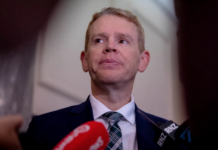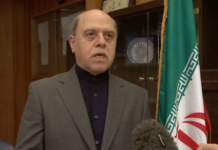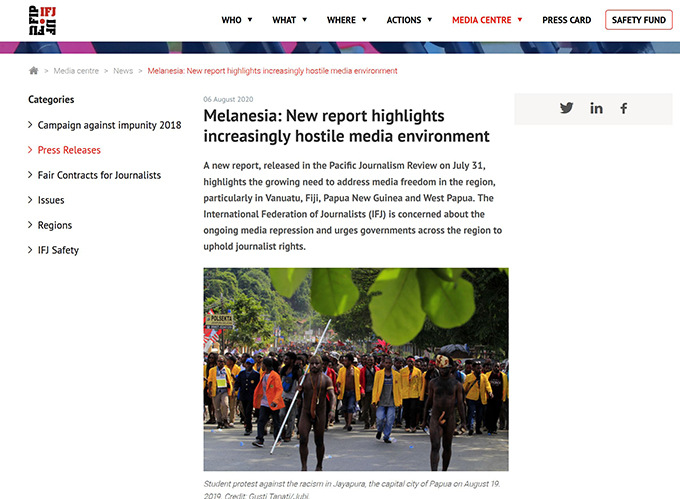
The Pacific Media Centre has protested to Facebook over censorship of a West Papuan media freedom news item in what its director, Professor David Robie, has described as an Orwellian example of the “tyranny of algorithms”.
The news item, published by the International Federation of Journalists on its Asia-Pacific website, reported the content of the latest edition of Pacific Journalism Review, saying that it “highlights the growing need to address media freedom in the region, particularly in Vanuatu, Fiji, Papua New Guinea and West Papua”.
IFJ added a rider saying it was “concerned about the ongoing media repression and urges governments across the region to uphold journalist rights”.
READ MORE: The Ben Bohane photo that Facebook censored on an article about Indonesia
Dr Robie attempted to share this item with several Facebook media groups, including The Pacific Newsroom with about 9000 followers, but each time immediately received a blocking message from Facebook declaring:
“Your post goes against our community standards on nudity or sexual activity.
“Only people who manage Pacific Media Centre can see this post. We have standards because some audiences are sensitive to different things when it comes to nudity.”
The algorithm-dictated objection to “nudity” apparently was because IFJ had published a photo from last year’s “Papua Uprising” in the Melanesian provinces of Papua and West Papua in response to a racist attack on students in the central Java city of Surabaya. Two of the male protesters were partly naked according to Papuan highlands tradition.
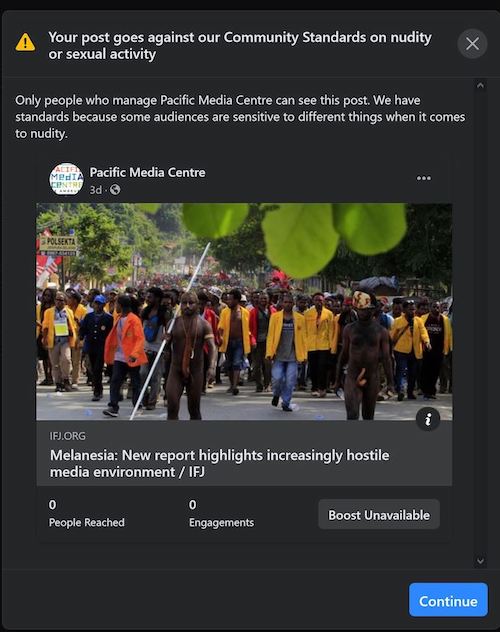
Orwellian action
In a message to the Paris-based Reporters Without Borders media freedom advocacy watchdog, Dr Robie said the Facebook action was Orwellian and an example of the random “tyranny of algorithms”.
“Anybody with common sense would see that the photograph in question was not ’nudity’ in the community standards sense of Facebook’s guidelines.
“This was a media freedom item and the news agency picture shows a student protest against racism in Jayapura on August 19, 2019. Two apparently naked men are wearing traditional koteka (penis gourds) as normally worn in the Papuan highlands.
“It is a strong cultural protest against Indonesian repression and crackdowns on media. Clearly the Facebook algorithms are arbitrary and lacking in cultural balance.”
Dr Robie attempted three times to file a challenge over this “arbitrary” decision on August 7, but received no reply and his Facebook page still carries a standards breach “warning” that will remain in force “for a year”.
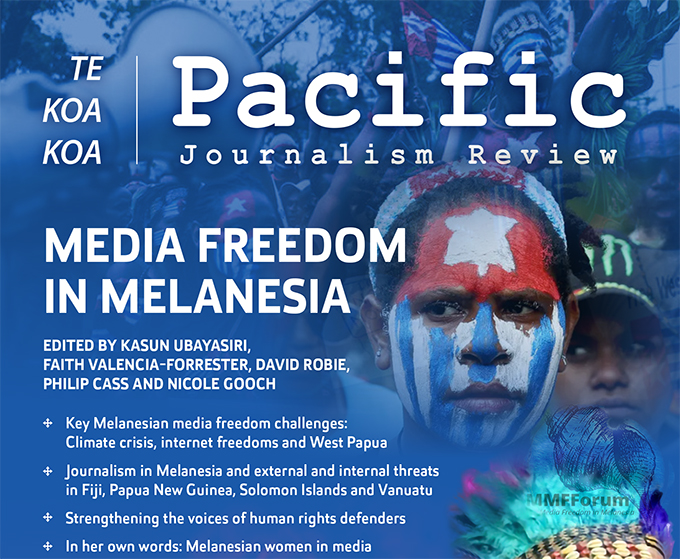
“This is absurd. The challenge process is a farce – merely a button with no field to enter specific reasons,” he told Pacific Media Watch.
“All I got was an automated message saying that ‘we usually offer the chance to request a review, and follow up if we got decisions wrong’. However, it added that ‘we have fewer reviewers available right now because of the coronavirus (covid-19) outbreak’.”
It was bizarre in that the original IFJ item on Facebook was apparently not blocked, just the PMC shared versions, he said.
https://www.facebook.com/IFJAsiaPacific/posts/3588004707899482
Another censored photo
In April 2018, Facebook censored a West Papua photo by Vanuatu-based photographer Ben Bohane that also showed traditional koteka.
In response to this latest example of “community” censorship, Bohane wrote on social media: “Facebook happily keeps taking Indonesian money for disinformation ads on West Papua, so no surprises they try to block legitimate news and photos from there…”
Nick Chesterfield of West Papua Media said this incident came just months after Facebook was “skull dragged into removing thousands of Indonesian intelligence agency bot accounts that were used for trolling, harassing and threatening journalists and human rights defenders, and posting fake news”.
He accused the Facebook team of “once again using their opaque, toxic and racist ‘community standards’ censorship machine” to support the Indonesian occupation of West Papua.
The Pacific Media Centre has protested to the Facebook policy director for Australia and New Zealand, Mia Garlick, but at the time of publication had yet to receive a reply.








